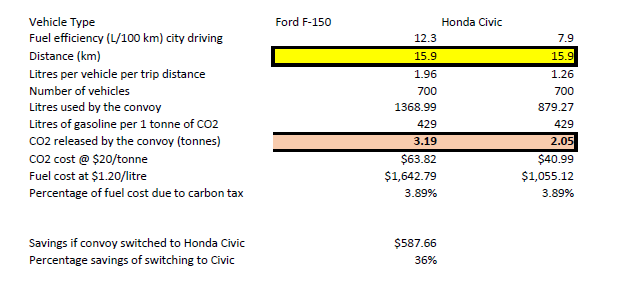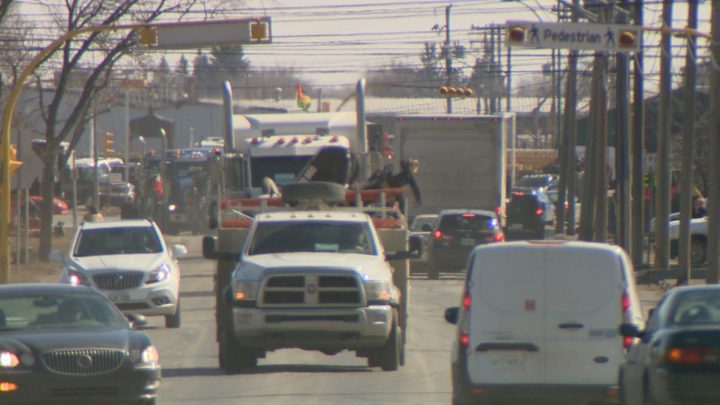From half-tons and semis to graders and oil field trucks, more than 700 vehicles met at Evraz Place in Regina to protest the federal government’s carbon tax on Thursday. But the group didn’t just leave a political mark on the Queen City, it also left a multi-tonne carbon footprint.

The convoy produced more than 3.19 tonnes of carbon dioxide, according to calculations by University of Regina economics professor Brett Dolter.
Factoring in the carbon tax, Dolter said drivers paid $1,642.79 collectively for fuel, with $63.82 going to the federal tax.
“In general, the overall impact of the carbon tax is small relative to the price of gas,” Dolter said in an email written to Global News. “It’s 3.89 per cent when gas is $1.20 per litre and the carbon tax is $20 per tonne.”
Dolter based his calculations on 700 Ford F-150 trucks travelling 15.9 km from Richardson – where most of the vehicles met – to the end of the convoy route at Evraz Place.

The equation doesn’t account for the variety of trucks, tractors and semis – all with different gas mileages – or the exact number of vehicles that took part in the convoy. It only uses a small portion of the convoy route and accounts for a one-way drive, not the round trip.
Considering many of the vehicles started the drive in the Estevan area, carbon emissions would be significantly higher than 3.19 tonnes.
Dolter compared the F-150 trucks to Honda Civics, a car with better gas mileage. If 700 Civics drove the route from Richardson to Evraz Place, 2.05 tonnes of carbon dioxide would be emitted.
“The goal of the carbon tax is to encourage people to switch to more efficient vehicles,” Dolter explained. “While people may not have flexibility in the short term, a carbon price that increases over time can encourage people to switch vehicles when the time is right.”
Dolter said a carbon price that gradually rises will encourage car companies to develop models that use less fuel, including electric vehicles. For example, Dolter said Ford plans on launching a hybrid-electric F-150 in 2020. The company has also committed to developing more electric vehicles in the future.
“That is the sort of innovation economists believe a carbon price will encourage, and will help us to transition to a net-zero emissions economy by mid-century,” Dolter said.
- RCMP arrests alleged hitmen accused of killing B.C. Sikh leader
- Fall COVID-19 vaccine guidelines are out. Here’s what NACI recommends
- Some 2019 candidates ‘appeared willing’ to engage with foreign interference: Hogue inquiry
- Thousands of Canada’s rail workers have a strike mandate. What happens now?




Comments